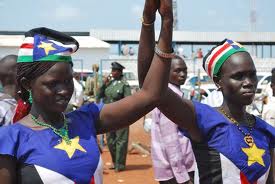Assessing the State of Women in South Sudan
Jul 26th, 2012 | By admin | Category: Family PlanningBy Suzanne York, HowMany.org
As much of the women’s rights and international development communities focused well-deserved attention on the London Summit on Family Planning in early July, South Sudan celebrated its first anniversary as a nation. Which made me wonder, what is the state of women in this newest of countries?
South Sudan is a nation of 10.6 million people. It often seems to be on the verge of another war with “the other” Sudan in the north, fighting over oil resources and revenues, and boundary demarcations. The country is also facing serious environmental and security issues: water and the threat of water wars, soil erosion, droughts and desertification, increasing impacts from climate change, and concerns over food security.
This is what USAID reports about South Sudan:
The vast majority of the population of the new nation lacks access to essential health services and to safe water and sanitation. These conditions contribute to poor health for the people of South Sudan and exceptionally high mortality rates, particularly of mothers, infants and children. The maternal mortality ratio is among the highest in the world, and one in every 10 infants will die before his or her fifth birthday.
The UK Guardian recently ran a piece on women in South Sudan, and depicts a very dismal situation for women’s rights. Rape, domestic violence, a reliance on dowrys (especially in rural areas), forced marriages, and child marriage. Despite an official marriage age of 18, as stated in the constitution, the Guardian noted that some girls marry as young as 14 years old. In Unity state, 24% of girls are married by 15 and 57% by 18.
Medecin Sans Frontieres says that conflict with the north has led to more than 100,000 Sudanese refugees fleeing Sudan since 2011 to South Sudan’s Upper Nile State, where communities already suffer from lack of water and shelter. According to UNHCR, the UN Refugee Agency, sexual and gender-based violence is widespread in South Sudan.
Education is key to empowering women and girls, and that is where South Sudan needs help. Statistics show that only 37% of girls attend primary school, secondary school attendance is negligible in many places, and less than a fifth of women (aged over 15) are literate compared with three-fifths of men.
Despite the bleak picture, there are glimmers of hope. While not much has been reported about reproductive rights in South Sudan, the government is willing to improve the plight of women. The UN’s Every Woman Every Child program reports that “South Sudan will develop and implement a range of national policies that will strengthen its response to women and children’s health, including policies on national family planning, on provision of free reproductive health services, especially Emergency Obstetric care services, on decentralization of budgeting, planning, management of health services, and on adolescent sexual and reproductive health and rights.”
Another sign of better things to come … Earlier this year, at an Aspen Institute seminar on women and water, one of the speakers was Salva Dut, a former Lost Boy from Sudan who founded the NGO Water for South Sudan (WSS). His organization has drilled 130 wells across many villages and trains the villagers – including women – in maintaining the wells. Dut understands that any solution to water scarcity goes beyond drilling wells; women must be put front and center and be given access to education and a means out of poverty. He believes women are the center of the economy. “Women are the engine,” Dut said.
For women the world over, what is most needed is gender equality, education, reproductive health and rights, economic opportunities, land and inheritance rights, greater political participation, and freedom from violence. The international community needs to support the people of South Sudan as they struggle to create a healthy and prosperous nation.
Suzanne York is a senior writer with the Institute for Population Studies/HowMany.org

